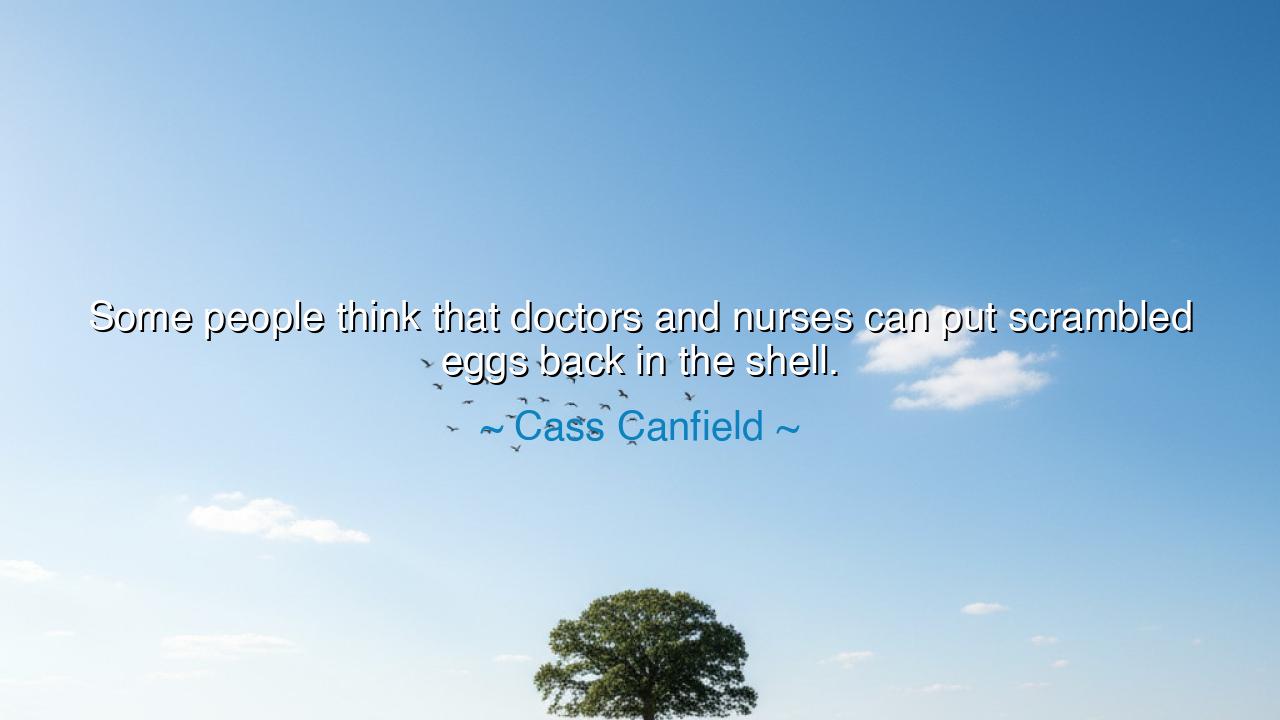
Some people think that doctors and nurses can put scrambled eggs






Hear, O seekers of wisdom, the words of Cass Canfield, a man of letters and insight, who declared: “Some people think that doctors and nurses can put scrambled eggs back in the shell.” In this utterance is found both humor and lament, for it speaks of the unrealistic expectations laid upon healers. The saying reminds us that even the most skilled physician and the most devoted nurse are bound by the laws of life: they can mend, they can comfort, they can extend, but they cannot undo what has already been broken beyond repair.
The origin of this thought rests in the timeless struggle between human hope and human limitation. Canfield, as a publisher and observer of society, saw how people often demand the impossible from medicine. We long to see youth restored, sickness reversed, and death itself denied. Yet his words paint this longing with a vivid image: to expect the healer to reverse all damage is as foolish as asking him to place the yolk and the white back into the fragile shell once it has been broken and scrambled. Medicine has great power, but it is not omnipotent.
History gives us many illustrations of this truth. Consider the Black Death that swept across Europe in the fourteenth century. The physicians of that age, though they tried valiantly, could not halt the tide of disease. They were accused, mocked, and sometimes despised for their failures, though no art of man could yet have contained such a scourge. The people demanded that the doctors put the “scrambled eggs back in the shell,” but no such power was granted to them. It was only centuries later, through learning and progress, that humanity found weapons against such plagues.
Yet Canfield’s words are not meant to diminish the nobility of healers, but to exalt their humanity. The doctor and the nurse are not gods, but servants of life, working with courage against impossible odds. Their task is not to reverse all brokenness, but to bring healing where healing is possible, to bring comfort where healing cannot be found, and to remind us that dignity is not lost even when life itself is slipping away. The true miracle is not in re-shelling the egg, but in offering strength, mercy, and compassion in the face of the inevitable.
The deeper wisdom here lies in humility. We, as patients and as people, must learn to accept that medicine is mighty but not absolute. To expect perfection is to condemn our healers to despair and ourselves to disappointment. Instead, we must honor what they can do and understand what they cannot. For often the greatest gift is not a cure, but the presence of one who stands beside us, bearing our pain with us.
O children of tomorrow, let this teaching guide you: do not place upon others the burden of the impossible. Respect the limits of what can be done, and be grateful for every act of healing, no matter how small. Learn to discern between what can be restored and what must be accepted. In this humility, you will find peace, and you will free others from the weight of impossible expectations.
Practically, let your life reflect this wisdom. When illness comes, trust your doctors and nurses, but do not demand of them miracles beyond their reach. Support them with gratitude, knowing they labor in a field where loss and victory walk hand in hand. And in your dealings with all people, not only in medicine, remember: no one can put scrambled eggs back in the shell. Do not demand the undoing of what cannot be undone, but seek instead the healing that can be given in the present moment.
Thus, Canfield’s words endure: “Some people think that doctors and nurses can put scrambled eggs back in the shell.” Let this be a reminder to walk with humility, to temper hope with wisdom, and to honor those who serve at the edge of human possibility. For in the end, the true art of healing is not in performing the impossible, but in giving compassion and strength where it is most needed.






AAdministratorAdministrator
Welcome, honored guests. Please leave a comment, we will respond soon